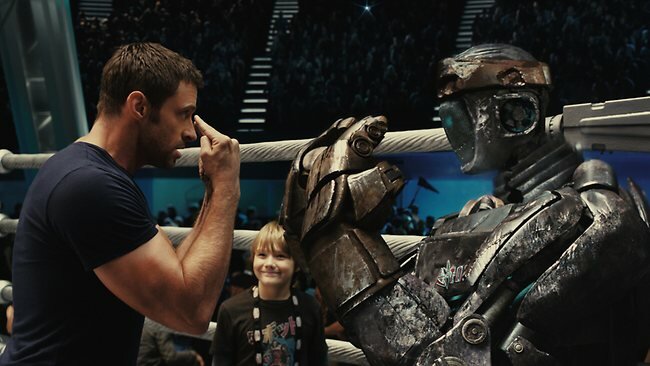Director Shawn Levy (Cheaper by the Dozen, Night at the Museum) has made a cozy career out of middling family films, and his latest effort, the robo-rumble Real Steel, is no exception. Set in a not-too-distant 2020 — you know it’s the future the moment you see wind turbines, as no government in the present would approve a renewable energy scheme — the film is based on a short story by I Am Legend author Richard Mattheson and not, as some have alleged, on the Mattel game Rock ‘Em Sock ‘Em Robots.
In this future, giant mechanical warriors have taken the place of human fighters in arena boxing. Hugh Jackman’s (X-Men Origins: Wolverine) and his distractingly prominent bicep veins plays Charlie Kenton, a washed-up boxer and absentee father who spends his time dodging debt collectors and trying to scrape together a living entering rundown robots in underground events. Soon after losing his star robot in a particularly absurd and rather disturbing set of circumstances, Charlie finds out that a former girlfriend has died and that her sister wants to take full custody of his eleven-year-old son, Max (Dakota Goyo; Thor). Sensing an opportunity to make score some quick cash, Charlie agrees to sign away his parental rights to the tune of $100,000 — to which the boy’s wealthy uncle agrees on the condition he looks after Max for three weeks while he and his wife enjoy a European vacation. What Charlie doesn’t count on is that Max is a movie child; a plucky, wisecracking scamp with an eye for robot boxing — an eye that just might come in handy when the unlikely duo uncover a rundown old robot named Atom and decide to train him for a fight.
While Real Steel might be the first movie ever made about professional robot boxing — Transformers doesn’t count — it still follows convention and genre clichés to an unabashed degree. Every step in the father and son’s underdog journey – every victory, every set back, every scene where they slowly learn to love each other – is telegraphed from the moment the opening credits role. As such, the score by Danny Elfman tells you exactly what you are meant to be feeling at every given moment, while several scenes backed by new tracks from Enimem and 50 Cent make you wonder how much money it takes to get “gangster” rappers like these to sell out to DreamWorks and an executive producing Steven Spielberg.

And yes, while Real Steel is considerably better thanTransformers 3 and marginally better than Cowboys & Aliens, there is no denying that that Spielberg’s name as producer, once synonymous with quality, is now a greater indication that a film will be high on budget but criminally lacking in imagination. Indeed, with the obscene amount of blatant product placement on display in Real Steel – quite honestly the most I can recall seeing in a movie – it would appear that there was more consideration given to keeping the Dr. Pepper cans in frame than was given to plot, character or meaning.
Of course, one could agrue that Real Steel is the twenty-first century equivalent to the movies that Spielberg himself used to make. There is little doubt that this movie will entertain boys between the ages of seven and fourteen; the action is frequent, well shot and the special effects – there’s no denying – are superb. But there is an insidious undercurrent to the violence in Real Steel that makes me hesitant to recommend it to families. At one point in the film Charlie mourns the end of real boxing, telling his son that audiences simply wanted more violence than the human body could handle. And this is exactly what Real Steel offers. The robots bash and dismember each other before collapsing into pools of their own motor oil, as the human crowd — our eleven year old protagonist included — cheer for more.
The violence is not the only disturbing cinematic convention that the movie is guilty of playing to. Evangeline Lily (Lost) appears as a love interest of sorts, a woman frequently dismissed and abandoned while Charlie is on the road, but who remains utterly helpless to his charms, willing to shoulder his emotional and financial neglect as long as he climbs into bed whenever he is in town.

A female character even more short changed was Max’s unseen mother, a woman whose death seems to have had not the slightest emotional impact on anyone including her pre-teen son, and whose passing serves as nothing more than a plot device to place the boy in the care of a man totally unfit to look after him. Jackman’s charisma does an enormous amount to rescue this film from being completely unwatchable, but all winning smiles aside, his character should have been put in prison for child endangerment by the end of the first half hour.
I’m not saying Real Steel will make your children murderers or misogynists. No, what it’s much more likely to do is give them poor taste. This movie might be a decent family film if it were the exception to Hollywood’s rule. But the truth of the matter is that mediocre and clichéd material like this – films that don’t even try to challenge audience expectations – makes up the majority of what the studios are churning out. There is not a skerrick of genuine feeling or creativity to Real Steel. Instead, there are only mechanics.
 Follow the author Tom Clift on Twitter.
Follow the author Tom Clift on Twitter.






 The Darkest Hour (Review)
The Darkest Hour (Review)







